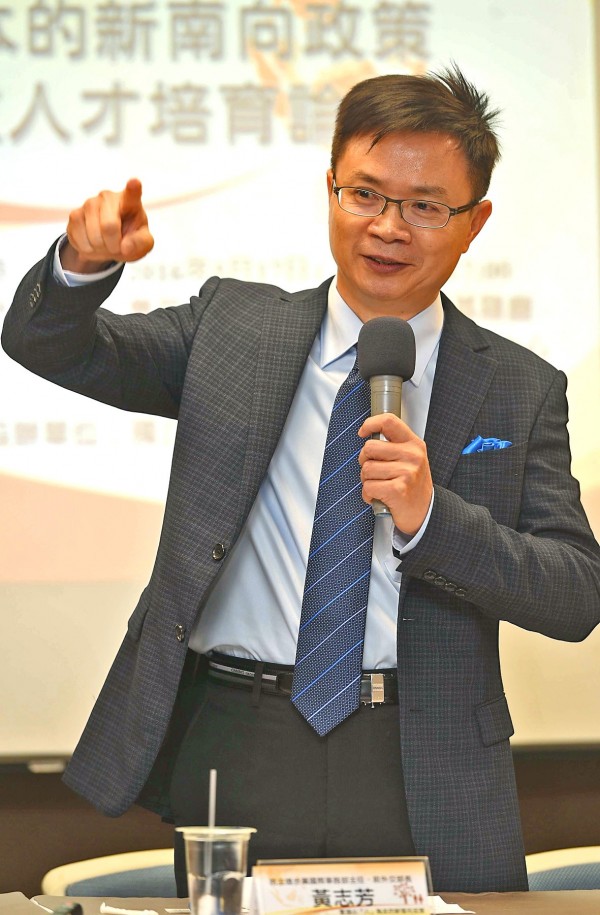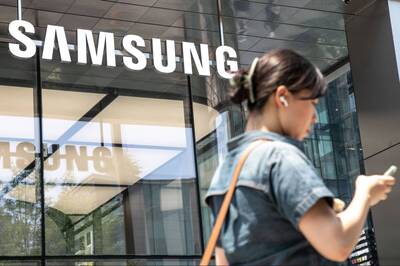《TAIPEI TIMES 焦點》 Ex-minister touts southbound policy

Democratic Progressive Party’s Department of International Affairs Director James Huang speaks at a press conference in Taipei yesterday, talking of the importance of a new southbound policy to build ties with Southeastern Asian nations rather than relying on the China market. Photo: Chang Chia-ming, Taipei Times
‘MISUNDERSTANDING’: The New Southbound Policy Office head said that the policy would not clash with cross-strait trade and could even be complementary
/ Staff writer, with CNA
Former Minister of Foreign Affairs James Huang (黃志芳), who has been named as the head of the New Southbound Policy Office, yesterday said that if Taiwan does not quickly expand its influence in Southeast Asia, it is likely to lose its edge in the region.
“Taiwan’s new southbound policy is getting a late start compared with other countries in the world,” Huang said, adding that the US, Japan, Australia, South Korea and China have been active in the region for many years.
“If Taiwan does not catch up quickly, the nation’s industry and economic advantages in ASEAN would gradually erode. This is the crux of the new southbound policy,” he said.
Speaking at a forum on the new southbound policy, Huang described the central tenet of the initiative as turning ASEAN into an extension of Taiwan’s domestic market.
If Taiwan still has an edge anywhere in the world, it would be in ASEAN, he said, adding that the edge might only last for five more years as the region makes rapid progress.
“If Taiwan does not seize the opportunities in the next five years, it is likely to be left with no advantage at all,” he said.
Taiwan first promoted a “go south” policy in the 1990s that tried to encourage companies to shift investment to Southeast Asia rather than heading to China in the hope of leveraging Taiwan’s economic might into political clout.
However, the policy gradually lost steam during the latter years of then-president Lee Teng-hui’s (李登輝) administration, especially after the 1997 Asian financial crisis.
That policy was focused on investment and trade figures, but the new southbound policy is centered on nurturing talent and encouraging bilateral exchanges to achieve its goals, Huang said.
It not only involves Taiwan going to ASEAN, but also having ASEAN members come to Taiwan for tourism and investment.
Citing an example of how the initiative might work, Huang said there are 6,400 Taiwanese businesses in Vietnam that create millions of jobs for that nation every year, but they also employ 80,000 Chinese managers to save on costs.
He said that if each Taiwanese business in Vietnam could provide an opening for one Taiwanese graduate, then they would have access to a talent pool of 6,400 people who could help them deal with their shortage of managers and future succession challenges.
Further cooperation with ASEAN could be difficult for Taiwan because of its lack of free-trade agreements with nations in the region and China’s massive political influence in the region.
Asked at the forum how the new administration would deal with the problem of ASEAN being wary of cooperation with Taiwan to avoid offending China, Huang said the premise of the question was based on a misunderstanding.
The new southbound policy is focused on talent cultivation and industrial, trade, cultural, educational and tourism exchanges, he said.
This is a soft policy that should play a positive role in Taiwan’s expanded relations with ASEAN, and its efforts there would not clash with cross-strait trade, but could even be “complementary,” he said.
That is because Asia is evolving into a tightly integrated region and such political issues would not arise within that framework, he added.
Huang is to serve as director of the office headed by president-elect Tsai Ing-wen (蔡英文), who is to assume office on Friday.
Huang said the New Southbound Policy Office would be responsible for communications and coordination among government agencies, but that the implementation of the policy would still be the responsibility of the various government agencies.
Huang, 57, is a seasoned diplomat, who served as minister of foreign affairs from 2006 to 2008 under then-president Chen Shui-bian (陳水扁).
新聞來源:TAIPEI TIMES














